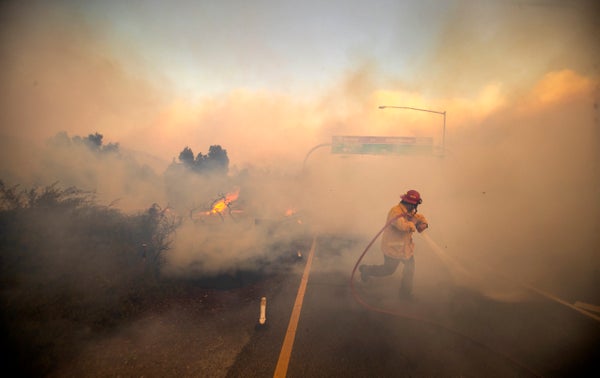November 26, 2024
3 min be taught
Wildfire Smoke Linked to Elevated Hazard of Dementia
The particles that make up wildfire smoke may enhance the hazard of dementia way more than comparable airborne air pollution from totally different sources

A firefighter is surrounded by heavy smoke as he battles the advancing Silverado Fireside fueled by Santa Ana winds on the 241 toll avenue and Portola Parkway on October 26, 2020 in Irvine, California.
Allen J. Schaben/Los Angeles Cases by means of Getty Images
CLIMATEWIRE | Wildfire smoke can worsen a variety of medical circumstances, from bronchial bronchial asthma to coronary coronary heart sickness.
Now, new evaluation offers one different concern to the mix. It could elevate the hazard of dementia.
A study revealed Monday throughout the scientific journal JAMA Neurologyfinds that long-term publicity to smoke concentrations is expounded to the subsequent menace of dementia prognosis over time. For each microgram enhance in wildfire air air pollution per cubic meter of air over the course of a three-year interval, the odds of dementia prognosis rise by about 18 %, the study finds.
On supporting science journalism
In case you are having enjoyable with this textual content, take into consideration supporting our award-winning journalism by subscribing. By shopping for a subscription you could be serving to to ensure the way in which ahead for impactful tales regarding the discoveries and ideas shaping our world instantly.
That’s in distinction with each explicit individual’s baseline menace of dementia prognosis, which stays comparatively low among the many many frequent inhabitants. Nonetheless, the elevated risks are large ample to pose a public properly being concern.
The study focuses on a kind of air air air pollution commonly known as particulate matter — tiny, inhalable particles, with diameters of two.5 micrometers or smaller. This form of air air air pollution can originate from a variety of sources, along with autos, industrial sources and fires.
Earlier analysis already have suggested that particulate matter can enhance the hazard of dementia, amongst totally different properly being points. The model new evaluation zooms in significantly on particles produced by wildfire smoke, which could have fully totally different chemical and bodily properties than particles produced by totally different sources.
The study examined medical data from higher than 1 million people in Southern California from 2008 to 2019, all part of the Kaiser Permanente Southern California medical care consortium. It moreover analyzed air top quality data from the similar time interval to estimate long-term air air pollution concentrations, along with particles stemming instantly from wildfire smoke.
The study found that wildfire smoke will enhance the hazard of dementia significantly higher than particulate matter from totally different sources. There are a selection of causes that would probably be the case, the researchers say.
Wildfire smoke particles are more likely to have higher concentrations of molecules recognized for toxic or inflammatory properties. And wildfire smoke tends to spike at certain events of the yr, in distinction with different types of air air air pollution — intermittently exposing communities to terribly extreme air air pollution concentrations, which may have increased outcomes on their properly being.
The study moreover found that certain demographics are at higher menace than others, along with people with lower incomes and people of color, along with Black, Hispanic and Asian communities.
Low-income communities often are at higher menace of publicity to air air air pollution, the researchers discover. Lower top quality housing in these communities may allow particulate matter to infiltrate homes additional merely, and residents may have a lot much less entry to air filtration strategies.
Marginalized groups moreover may cope with additional properly being challenges, partially on account of systemic discrimination, compounding their risks of rising dementia later in life.
“Everyone knows that native climate change impacts primarily probably the most weak communities first and worst and we appear to see a similar sign up our data,” talked about Joan Casey, an environmental epidemiologist and co-author of the model new study, in an email correspondence to POLITICO’S E&E Data.
Policymakers can take certain steps to protect these weak communities, she added. They will be sure that all communications about public properly being are issued in plenty of languages. And to allow them to push for insurance coverage insurance policies geared towards combating native climate change, decreasing totally different sources of air air air pollution and mitigating wildfires via strategies paying homage to science-based managed burns.
Within the meantime, there are totally different questions that scientists can examine in future evaluation.
The model new study checked out dementia of each variety. Nonetheless future analysis can study whether or not or undecided styles of circumstances, paying homage to Alzheimer’s sickness, have stronger ties to wildfire smoke than others.
The evaluation crew may also be “very curious” regarding the outcomes of plenty of native climate hazards working collectively, Casey added. If wildfires happen to coincide with vitality outages, for instance, that will prohibit the ability of many households to utilize air filtration strategies — most likely worsening their properly being risks.
These types of questions are rising additional urgent because the outcomes of native climate change worsen. Present evaluation has found that a couple of quarter of all particulate matter air air pollution within the USA comes from wildfire smoke. And in parts of the Western U.S., smoke is accountable for as so much as half.
Reprinted from E&E Data with permission from POLITICO, LLC. Copyright 2024. E&E Data provides necessary data for energy and environment professionals.












Leave a Reply